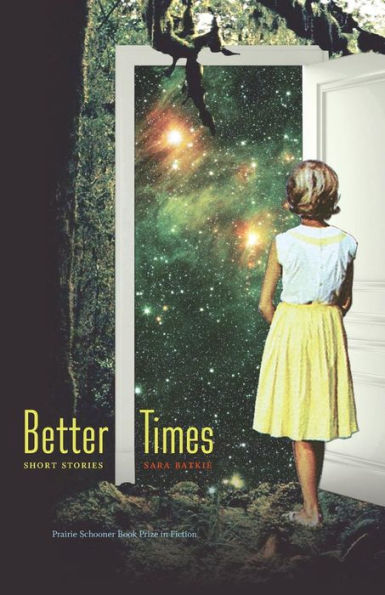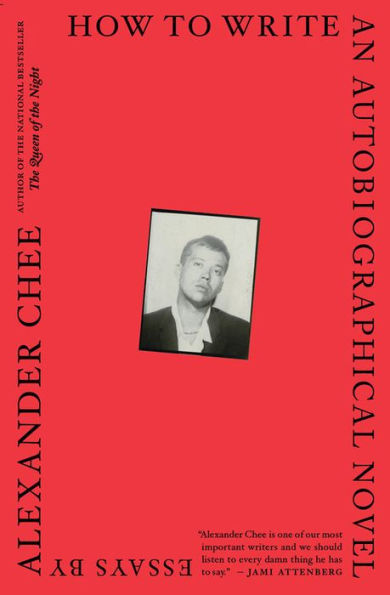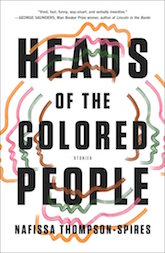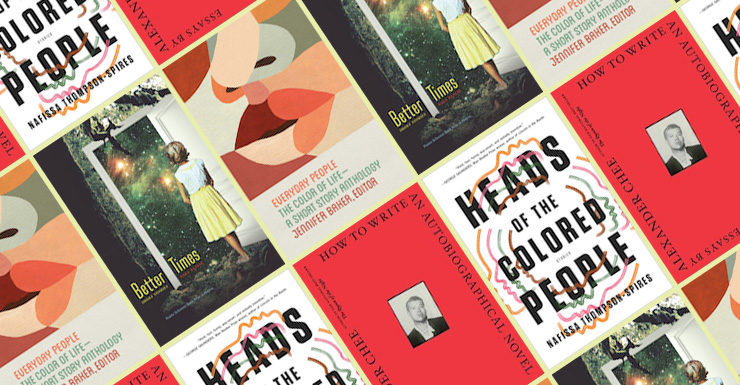Usually I use TBR Stack to dive into a book I’ve been eyeing for months or even years, hoping each time that I’ll be able to breathlessly recommend it to you. This time I’ve decided to do something different: I’m recommending four books.
Or, more specifically, I’m recommending some excellent speculative short fiction, and one essay, that I found lurking in otherwise realistic collections. Sara Batkie’s Better Times, Everyday People, edited by Jennifer Baker, Alexander Chee’s How to Write an Autobiographical Novel, and Nafissa Thompson-Spires’ The Heads of the Colored People are all great recent collections that each contain speculative gems.
“Cleavage” and “Lookaftering,” Better Times by Sara Batkie
Buy the Book


Better Times
Sara Batkie’s debut short story collection, Better Times, was the winner of Prairie Schooner Book Prize in Fiction. While the collection is largely realistic literary fiction, two of the stories edge into the speculative. In “Cleavage,” Batkie takes the medical phenomenon of the phantom limb and leans into the “phantom” part. A young woman is essentially haunted by her right breast after she’s diagnosed with cancer and has to have a radical lumpectomy. The breast returns, and seems to be at least somewhat sentient, as it responds to her anger and frustration with flare-ups of pain and itchiness, and scratches against clothing and sheets. The woman’s attempts to wear a falsie turn into wrestling matches. At least in a haunted house, you can sometimes escape, call an exorcist, call the old lady from Poltergeist. But what can you do when it’s your body that’s haunted?
In “Lookaftering,” a young couple’s relationship is thrown into turmoil when the woman, who seemingly lives in our own straightforward universe, lays eggs. What I loved in this story, other than the utter matter-of-factness of the egg-laying, was that the central question wasn’t: is she going to keep the eggs? but rather: is the guy going to stick around?
Like a lot of boundary-pushing fiction, the eggs become a symbol of the couple’s nervousness about their relationship. But like the best boundary-pushing fiction, the eggs also remain, resolutely eggs. They need to be kept warm, but not too warm. They need a nest. Louisa can’t sit on them to warm them—as a human, she’s far too heavy. They’ll hatch eventually, and who knows what will come out? Naturally word gets out, and soon the apartment complex is swarming with people who either want to help or gawk. But Batkie is very good about holding her reader close to the emotional core of the story.
The other obvious note is that both of these stories are about extremely gendered experiences. In both cases young women, who are past the emotional flamethrower of puberty, and are expected to be comfortable in their bodies, fulfilling their various roles as women in society, find that their bodies, through no conscious decisions of their own, rebel against those roles. Obviously, cancer is cancer, but the protagonist in “Cleavage” doesn’t rail against her diagnosis. We don’t hear a catalogue of her chemo treatments or vomit or hairloss. What happens is that the ghost of her missing breast haunts her, reminding her constantly that her body has been changed without her consent. In the same way, “Lookaftering” gives us a woman who’s just hitting the age, and the relationship status, at which total strangers start asking about marriage and kids. And it’s at this point that her body rebels and does something completely impossible and unexpected, a kind of skewed motherhood that she does not want, that puts her on display and hijacks her body in even more extreme ways than a human pregnancy would have. In both stories there’s a very real sense tghat these women are passengers in their bodies, held hostage by society and playing along with lives they don’t fully recognize out of the fear that rebelling will just make it worse.
“Link” by Courttia Newland and “If a Bird Can be a Ghost” by Allison Mills, Everyday People, edited by Jennifer Baker
Buy the Book


Everyday People: The Color of Life--a Short Story Anthology
Courttia Newland’s “Link” opens the collection. The story takes us to London on the eve of the Brexit vote, and drops us straight into the mind of Aaron, a Black college student with psychic abilities. When we meet him, he’s just made contact with a group of young people who share his power. But how will they use it? The story is a fantastic example of how political ideas and sci-fi can energize each other, as Newland takes a hard look at modern London, xenophobia, and racial tension, while also giving us a twist on the time-honored phrase “With great power must come great responsibility” and a haunting coming-of-age story.
Allison Mills’ entry, “If a Bird Can Be a Ghost,” follows a young girl named Shelly whose grandmother is training her in the gentle art of Ghostbusting. People hire Grandma (sometimes paying with trinkets, sometimes with food, and sometimes with cash) and Grandma and her apprentice walk through apartments and homes and crime scenes catching ghosts in their hair. Not to trap them or exorcise them, or anything violent, simply to give them a light nudge on to wherever they’re supposed to go next. But not every ghost needs to move on, and Grandma teaches Shelly to have a live-and-let-live attitude with spirits that are staying in sacred spaces. The first time she takes her protege to a graveyard she introduces her to a friend—a teenage ghost:
He looks up at Grandma and Shelly with eyes like black holes.
“Hello, Joseph,” Grandma says, sticking a hand in her handbag and pulling out a stack of old tapes. She puts them on the grave in front of the boy and he smiles at her.
“Old Lady,” he says. His mouth moves, but his voice comes from the headphones around his neck. He pops open his ghostly Walkman and inserts the tapes, one by one, right after each other. They disappear as they slide into place, dissolving into the player. “You want to know who’s walking around the yard?”
“I want to introduce you to my granddaughter,” Grandma says. “Joseph, this is Shelly.”
Joseph turns his disconcerting eyes on Shelly. She does her best not to take a step back. After a moment, she gives Joseph a quick bow because she’s not sure what else to do with him staring like that.
Joseph laughs. “I like her,” he says. “Old Lady never introduced me to anyone before, Little Shell. You must be special. You ever heard of the Cure?”
Shelly shakes her head.
Joseph opens his Walkman and reaches inside. His hand slips down, all the way to his elbow, as he digs around inside, and he pulls out a cassette and holds it out to Shelly. “This is a good one,” he says. “Take care of it for me.”
Shelly takes the tape—Disintegration. It’s so icy cold that touching it feels like being burned, but Grandma taught her how to accept gifts from the dead. When they give you something, you must be grateful. You s mile and you say thank you and you take good care of it.
The story is a lovely mix of delicacy and harsh reality, and like any story dealing with death, the fact that all happiness is fleeting lurks under every line. But the story is animated by the idea that care for the living and the dead is, like all work, intrinsically noble.
Everyday People, is, I hope, a sign of things to come—not only because it’s a politically engaged collection gathering stories from a diverse array of authors, but also because it opens with unapologetic sci-fi, and can include aching realism like Dennis Norris II’s “Last Rites” and Yiyun Li’s “A Sheltered Woman,” firebrand cultural commentary like Jason Reynolds’ “The African-American Special,” tragicomedy like Alexander Chee’s “Mine,” and a joyful ghost tale, without letting arguments about genre get in the way of a good story.
“The Querent,” How to Write an Autobiographical Novel by Alexander Chee
Buy the Book


How to Write an Autobiographical Novel
Alexander Chee’s collection of essays, How to Write an Autobiographical Novel, contains some of the greatest writing advice I’ve ever read–especially because his thoughts on writing will be useful whether you’re writing litfic, nonfiction, scifi, romance, whatever. Chee is extraordinarily generous with his time, talking about what he learned from his own teachers, how his life as an LGBTQIA activist has impacted his creative work, and, maybe most important of all, how his day jobs have shaped him as a writer. So many people want to create this glossy image of a “writer’s life” of sitting at desk or repairing to a shed and opening a vein, but most people I know are tapping out stories on their phones during their commute to work, or taking a few minutes during work to write scenes in emails, or missing parties and beach trips so they can carve out a few hours to work on the weekends. Chee if very real about this tension between artistic aspirations, bank account, and, you know, life.
However! The essay that I want to talk about is called “The Querent,” and it’s the rare nonfiction piece that also works as a speculative fiction. Chee starts the essay with a scene from his past: a psychologist visits his 7th grade class and tests all the kids for psychic abilities, as a somewhat loopy part of ongoing government/military research into creating super soldiers. (I’m not making this up, by the way, and neither is Chee—go read The Men Who Stare at Goats if you’re interested.) Twelve-year-old Chee tests very well, but it doesn’t lead to him to a career as a top secret government firestarter like he hopes. Instead, he finds himself drawn more and more to the Tarot, and begins learning its history and reading techniques.
The essay digs into the push/pull between historical fact and lore, between mysticism and rationalism. It looks at the ways secular Western culture’s propensity for turning other cultures’ cherished beliefs into ‘fantasy.’ And of course he heart of the essay dwells on an age-old question: if you could have the superpower of knowing the future, what would you do with it? As kids, a lot of us read X-Men comics and Stephen King novels because we feel like freaks, and what we want more than anything is to turn that freakishness into power. But if that power seems to land in our laps, what will that actually do to us? Will it crack our idea of the world’s reality? Will it shock us? Would it give us a sense of seeing behind a curtain, or would it sap all meaning from life if we could know the future before it unfolded?
the push/pull between cultures, between fact and fiction, the desire people have to impose narrative on randomness, the desire people have to know the future, because they see their lives as a story being written.
“The Heads of the Colored People,” The Heads of the Colored People by Nafissa Thompson-Spires
Buy the Book


Heads of the Colored People: Stories
The title story of Thompson-Spires debut collection is a great example of what I’ll call ‘nerd adjacent’ fiction can do. “The Heads of the Colored People” is utterly realistic, but it takes the geek loves of anime and superheroes out into the real world. A young man named Riley is heading to comics convention, when he’s stopped by another man. Both men are Black, one is a college student, one is not, and a day that should have been fun takes a very different turn:
Riley wore blue contact lenses and bleached his hair—which he worked with gel and a blow-dryer and a flatiron some mornings into Sonic the Hedgehog spikes so stiff you could prick your finger on them, and sometimes into a wispy side-swooped bob with long bangs—and he was black. But this wasn’t any kind of self-hatred thing. He’d read The Bluest Eye and Invisible Man in school and even picked up Disgruntled at a book fair, and yes, they were good and there was some resonance in those books for him, but this story isn’t about race or “the shame of being alive” or any of those things. He was not self-hating; he was even listening to Drake—though you can make it Fetty Wap if his appreciation for trap music changes something for you, because all that’s relevant here is that he wasn’t against the music of “his people” or anything like that—as he walked down Figueroa with his earbuds pushed in just far enough so as not to feel itchy.
I don’t want to say too much about plot here, because I want you to read the story for yourselves. If I say that it loops around issues of race, will that drive you away? As I said, I want you to read the story, and if that previous sentence drives you away, I want you to read it even more. If I say it deals with issues of race, does that diminish the story? I think so, actually, because what it’s about, among other things, is perception. The way two Black men perceive each other, the way geeks perceives each other, and how that shifts across racial lines, self-hatred and respectability politics and all the rest of the absurd weight that gets loaded up on black shoulders while white geeks are able to throw on a wig and some makeup or maybe a squirrel tail or maybe a Rick and Morty shirt and head out to the convention center, how men and women perceive each other, how white authority figures view anybody Black. It does this through references to Rurouni Kenshin, Cowboy Bebop, Naruto, X-Men, and general ’90s nostalgia. I would argue that it points out the ways the larger geek community failed its black and brown members. It acknowledges racism within the cosplay community, and then loops around again to interrogate itself without ever letting the true perpetrators of violence off the hook. But it does all of this without ever becoming heavy-handed, or labored in any way. The political interrogation of the story is necessary. The meta deconstruction of the narrative is necessary. And it’s still a gorgeous read, and a fascinating way to open a collection of literary fiction. I love that Thompson-Spires allows herself to lean into fandom and trusts her readers to get the references, and uses geek references that people might find silly to make vital points about our society.
OK! I hope this cavalcade of reading recommendations carries you through the first bit of autumn, and I also hope that you’ll tell me about your own favorite collections in the comments!
Leah Schnelbach knows that as soon as this TBR Stack is defeated, another shall rise in its place. Come celebrate brevity with her on Twitter!










